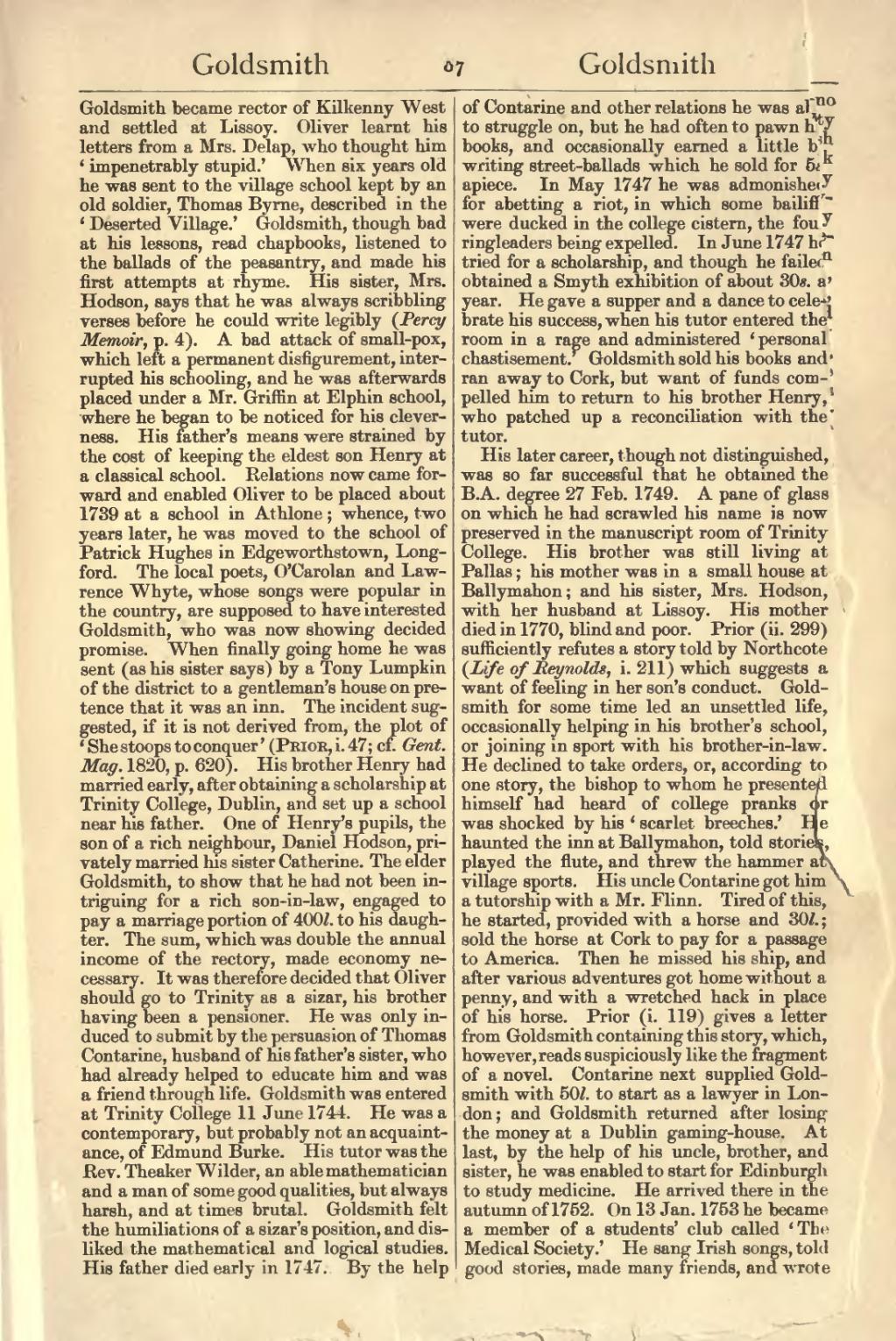Goldsmith became rector of Kilkenny West and settled at Lissoy. Oliver learnt his letters from a Mrs. Delap, who thought him ‘impenetrably stupid.’ When six years old he was sent to the village school kept by an old soldier, Thomas Byrne, described in the ‘Deserted Village.’ Goldsmith, though bad at his lessons, read chapbooks, listened to the ballads of the peasantry, and made his first attempts at rhyme. His sister, Mrs. Hodson, says that he was always scribbling verses before he could write legibly (Percy Memoir, p. 4). A bad attack of small-pox, which left a permanent disfigurement, interrupted his schooling, and he was afterwards placed under a Mr. Griffin at Elphin school, where he began to be noticed for his cleverness. His father's means were strained by the cost of keeping the eldest son Henry at a classical school. Relations now came forward and enabled Oliver to be placed about 1739 at a school in Athlone; whence, two years later, he was moved to the school of Patrick Hughes in Edgeworthstown, Longford. The local poets, O'Carolan and Lawrence Whyte, whose songs were popular in the country, are supposed to have interested Goldsmith, who was now showing decided promise. When finally going home he was sent (as his sister says) by a Tony Lumpkin of the district to a gentleman's house on pretence that it was an inn. The incident suggested, if it is not derived from, the plot of ‘She stoops to conquer’ (Prior, i. 47; cf. Gent. Mag. 1820, p. 620). His brother Henry had married early, after obtaining a scholarship at Trinity College, Dublin, and set up a school near his father. One of Henry's pupils, the son of a rich neighbour, Daniel Hodson, privately married his sister Catherine. The elder Goldsmith, to show that he had not been intriguing for a rich son-in-law, engaged to pay a marriage portion of 400l. to his daughter. The sum, which was double the annual income of the rectory, made economy necessary. It was therefore decided that Oliver should go to Trinity as a sizar, his brother having been a pensioner. He was only induced to submit by the persuasion of Thomas Contarine, husband of his father's sister, who had already helped to educate him and was a friend through life. Goldsmith was entered at Trinity College 11 June 1744. He was a contemporary, but probably not an acquaintance, of Edmund Burke. His tutor was the Rev. Theaker Wilder, an able mathematician and a man of some good qualities, but always harsh, and at times brutal. Goldsmith felt the humiliations of a sizar's position, and disliked the mathematical and logical studies. His father died early in 1747. By the help of Contarine and other relations he was able to struggle on, but he had often to pawn his books, and occasionally earned a little by writing street-ballads which he sold for 5s. apiece. In May 1747 he was admonished for abetting a riot, in which some bailiffs were ducked in the college cistern, the four ringleaders being expelled. In June 1747 he tried for a scholarship, and though he failed obtained a Smyth exhibition of about 30s. a year. He gave a supper and a dance to celebrate his success, when his tutor entered the room in a rage and administered ‘personal chastisement.’ Goldsmith sold his books and ran away to Cork, but want of funds compelled him to return to his brother Henry, who patched up a reconciliation with the tutor.
His later career, though not distinguished, was so far successful that he obtained the B.A. degree 27 Feb. 1749. A pane of glass on which he had scrawled his name is now preserved in the manuscript room of Trinity College. His brother was still living at Pallas; his mother was in a small house at Ballymahon; and his sister, Mrs. Hodson, with her husband at Lissoy. His mother died in 1770, blind and poor. Prior (ii. 299) sufficiently refutes a story told by Northcote (Life of Reynolds, i. 211) which suggests a want of feeling in her son's conduct. Goldsmith for some time led an unsettled life, occasionally helping in his brother's school, or joining in sport with his brother-in-law. He declined to take orders, or, according to one story, the bishop to whom he presented himself had heard of college pranks or was shocked by his ‘scarlet breeches.’ He haunted the inn at Ballymahon, told stories, played the flute, and threw the hammer at village sports. His uncle Contarine got him a tutorship with a Mr. Flinn. Tired of this, he started, provided with a horse and 30l., sold the horse at Cork to pay for a passage to America. Then he missed his ship, and after various adventures got home without a penny, and with a wretched hack in place of his horse. Prior (i. 119) gives a letter from Goldsmith containing this story, which, however, reads suspiciously like the fragment of a novel. Contarine next supplied Goldsmith with 50l. to start as a lawyer in London; and Goldsmith returned after losing the money at a Dublin gaming-house. At last, by the help of his uncle, brother, and sister, he was enabled to start for Edinburgh to study medicine. He arrived there in the autumn of 1752. On 13 Jan. 1753 he became a member of a students' club called ‘The Medical Society.’ He sang Irish songs, told good stories, made many friends, and wrote
